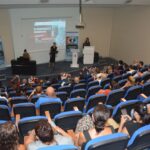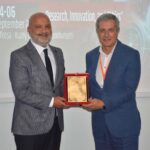
The three-day “XVIIth International Congress of Educational Research,” hosted by Near East University participated by more than 130 participants and over 70 scientific papers were presented. 40 teachers received hands-on training in workshops organized as part of the congress.
The International Congress of Educational Research (ICER), one of the most important international platforms in the world of education where innovative approaches are discussed, research results are shared, and strategies that will shape the future are developed, was hosted by Near East University this year. The 17th congress was held in collaboration with the Atatürk Faculty of Education of Near East University and the Turkish Educational Research Association under the theme “Shaping Education with Artificial Intelligence: Research, Innovation, and Ethics.”
ICER 2025, also recognized by the World Educational Research Association (WERA), attended by more than 130 participants and over 70 scientific papers were presented. 40 teachers received hands-on training in workshops organized as part of the congress.
The congress, which began with a moment of silence and the singing of the National Anthem, continued with a musical performance by Dr. Gözdem İlkay, a lecturer in the Department of Music Education at the Atatürk Faculty of Education of Near East University, and Lecturer İmge Dinçer. Opening remarks were delivered by Near East University Rector Prof. Dr. Tamer Şanlıdağ, Near East University Atatürk Faculty of Education Dean Prof. Dr. Umut Akçıl, and Dr. Enver Yolcu, President of the Educational Research Association. Also invited speakers Assoc. Prof. Dr. Olgun Sadık from Indiana University, Prof. Dr. Salim Razı from Çanakkale Onsekiz Mart University, and Prof. Dr. Hatice Yıldız Durak from Necmettin Erbakan University attended the event.
Research and new perspectives unite under one roof…
The congress, which addressed a wide range of topics from EU education programs and environmental education, from child development and education to democracy and human rights education, brought participants together with current research conducted in various disciplines. Studies in areas such as character, values, and love education, religious education, educational philosophy, educational policies, and the history of education were presented to the participants. Besides, the research findings in various disciplines such as educational technologies, teacher training, special education, higher education, health and sports sciences, and social sciences education were also shared.

Prof. Dr. Tamer Şanlıdağ: “ICER 2025 will leave a significant mark with its scientific outputs and the academic collaborations it will create!”
Near East University Rector Prof. Dr. Tamer Şanlıdağ emphasized that education is the most powerful tool for the advancement of humanity and the development of societies, saying, “Achieving lasting success in education is possible through innovative approaches supported by scientific research and capable of responding to the needs of the age. This is precisely where ICER offers scientists, researchers, and academics the opportunity to share their ideas, establish collaborations, and jointly build the vision of education for the future.”
As Near East University, Prof. Dr. Şanlıdağ stated, “With this belief, we see our support for educational research not as a responsibility, but as a duty to humanity.” Prof. Dr. Şanlıdağ emphasized that every paper shared and every discussion held at the congress will contribute to the future of education and the development of new generations as better-equipped individuals. Stating that ICER 2025 will leave a significant mark with its scientific outputs and the academic collaborations it will foster, Prof. Dr. Şanlıdağ thanked all stakeholders who contributed to the congress.

Dr. Enver Yolcu: “By discussing the role of artificial intelligence in education from a multidimensional perspective, we will develop knowledge and recommendations that will shape the education systems of the future.”
Educational Research Association President Dr. Enver Yolcu addressed the main theme of the congress, saying, “The main theme of our congress, ‘Shaping Education with Artificial Intelligence: Research, Innovation, and Ethics,’ offers a perspective that reflects not only our age but also the future.” Emphasizing that the world of education has now moved beyond digitalization, Dr. Yolcu said, “Today, we are experiencing an evolution toward AI-supported learning systems, personalized instructional designs, and data-based decision-making processes. This transformation brings out significant opportunities as well as significant responsibilities.”
Dr. Yolcu stated that AI is not just a technology but also a fundamental paradigm shift that is redefining the nature of education, adding, “We are witnessing revolutionary developments in many areas, from learning analytics to teacher support systems, from assessment tools to content creation. However, these developments must be implemented in a sustainable, equitable, and humane manner.”
Emphasizing that researchers should seek answers not only to the question “What can be done?” but also to the question “What should be done?”, Dr. Yolcu said, “I believe that at this congress, we will discuss the role of artificial intelligence in education in a multifaceted manner and develop knowledge and recommendations that will shape the education systems of the future by centering ethics and principles.”

Prof. Dr. Umut Akçıl: “This congress aims to bring research, innovation, and ethics together on a common ground.”
Prof. Dr. Umut Akçıl, Dean of the Atatürk Faculty of Education at Near East University, emphasized that individualizing learning processes, enriching teaching methods, and strengthening equal opportunity now seem more possible than ever before, emphasizing that every technological advancement brings responsibilities with it. Prof. Dr. Akçıl said, “It is crucial that artificial intelligence in education be shaped with a human-centered, ethical principle-based approach that prioritizes the benefit of society. This congress aims to bring together research, innovation, and ethics on a common ground with this sense of responsibility.” Prof. Dr. Akçıl, stating that the congress is both scientific and visionary, said, “With the contributions of distinguished speakers from the United States and Turkey, we will not only share knowledge but also have the opportunity to discuss visions, critical perspectives, and collaboration opportunities that will shape the future of education.”


